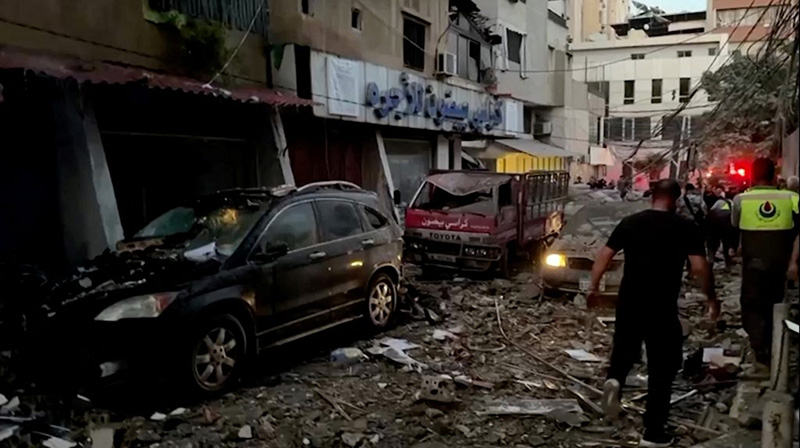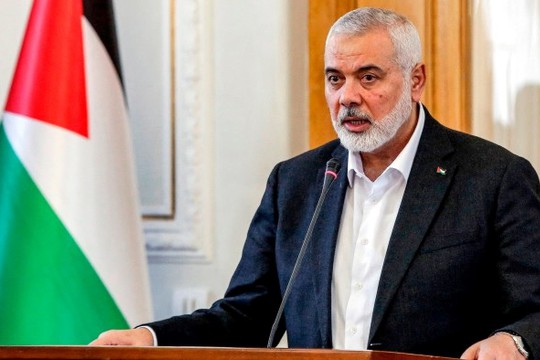Ismail Haniyeh, political chief of the Palestinian militant group Hamas killed in Teheran by Israel’s strike.
Photo: AFP
Assassination of Ismail Haniyeh in Tehran has dramatically raised risk of escalation of hostilities, writes ‘The Financial Times’.
Iran has accused Israel of assassinating Hamas’s political leader Ismail Haniyeh in a strike in Tehran and vowed to avenge his death as the attack dramatically raised the risk of a further escalation of regional hostilities.
Haniyeh was killed in a strike on his residence in Tehran in the early hours of Wednesday morning, Hamas and Iranian officials said.
The attack came hours after Israel said it had killed a senior Hizbollah commander in an air strike on Beirut, the Lebanese capital, heightening fears that the region was sliding towards a full-blown war.
Israel did not claim responsibility for Haniyeh’s death and typically neither confirms nor denies assassination attempts in Iran. But Israeli officials have previously said they would hold all Hamas leaders accountable for the group’s October 7 attack on southern Israel.
On Wednesday, Israeli defence minister Yoav Gallant said: “The operation tonight in Beirut was precise and professional. We do not seek war, but we are preparing for all possibilities.”
Haniyeh had attended the inauguration of Iran’s new president Masoud Pezeshkian on Tuesday and met him earlier in the day.
Iran’s supreme leader Ayatollah Ali Khamenei threatened Israel with a call to “avenge [Haniyeh’s] blood”, saying it was a “duty” for Iran because the incident “occurred within the territory of the Islamic Republic”.
He added: “The criminal and terrorist Zionist regime martyred our dear guest in our home and caused us grief, but it has also paved the way for severe punishment for itself.”
Haniyeh, who has been Hamas’s political leader since 2017, is the highest-profile member of Hamas to be killed following the militant group’s October attack and Israel’s retaliatory offensive in Gaza. He was the main interlocutor for mediators trying to negotiate a ceasefire in Gaza and the release of Israeli hostages held in the strip.
Qatar, which has been one of the lead mediators with Hamas during the negotiations to free Israeli hostages held in Gaza, said Haniyeh’s killing was a “heinous crime and dangerous escalation”.
Qatari Prime Minister Sheikh Mohammed bin Abdulrahman al-Thani said: “Political assassinations and continued targeting of civilians in Gaza while talks continue leads us to ask: how can mediation succeed when one party assassinates the negotiator on [the] other side?”
On Wednesday, US secretary of state Antony Blinken told a television news programme in Singapore that the assassination of Haniyeh was “something we were not aware of or involved in”.
Haniyeh’s killing in Tehran risks the regime retaliating against Israel. Tensions in the region had already soared after Israel said it had killed Fuad Shukr, a senior Hizbollah commander, in an air strike on a residential building in southern Beirut on Tuesday.
The Israel Defense Forces described Shukr as Hizbollah’s most senior military commander and right-hand man to Hassan Nasrallah, leader of the Iran-backed Lebanese militant group.
In a statement mourning Haniyeh, Hizbollah said his killing would “increase the determination and stubbornness of the resistance fighters in all resistance arenas to continue the path of jihad and will make their resolve stronger in confronting [Israel]”.
Turkey’s foreign ministry condemned Haniyeh’s killing, warning that it risked widening “the war in Gaza to a regional scale”.
It added: “If the international community does not take action to stop Israel, our region will face much larger conflicts.”
 Damaged vehicles are seen after an Israeli strike on Beirut’s southern suburbs, Lebanon July 30, 2024.
Damaged vehicles are seen after an Israeli strike on Beirut’s southern suburbs, Lebanon July 30, 2024.
Photo: Reuters
An Israeli airstrike targeted the southern suburbs of the Lebanese capital of Beirut on Tuesday, a step that could escalate the Israel-Hezbollah conflict into a full-blown war, writes News Antiwar.
Israel said that it targeted a senior Hezbollah commander, Fuad Shukr. A Lebanese government official told CNN that Shukr survived the strike, while Israel is claiming he was killed. Lebanon’s Health Ministry is reporting that three civilians, including two children, were killed in the attack and 74 others have been wounded.
The Israeli military claimed Shukr was responsible for the rocket that killed 12 Druze children in the Israeli-occupied Golan Heights on Saturday. Hezbollah denied responsibility for the killing of the children and has said they were hit by an Israeli air defense rocket.
According to Al Jazeera, Hezbollah has warned that if Israel launched a strike deep into Lebanese territory, it would mean “all rules of war” are off. The last time Israel bombed Beirut was on January 2, when the Israeli military launched a drone strike that targeted a senior Hamas official.
Media reports said the US was warning Israel against targeting Beirut, but the US is still providing unconditional military aid and not using any of its leverage to rein in Israel. The US has also previously ensured it would back Israel in a full-blown war in Lebanon.
Any Israeli attack on Lebanon will have severe consequences for Israel, Iranian President-elect Masoud Pezeshkian said in a phone call with his French counterpart Emmanuel Macron on 29 July, Iran’s semi-official Tasnim news agency reported.
“The Zionist regime will be making a big mistake if it attacks Lebanon, which will carry heavy consequences for them [the Israelis],” the Iranian president warned.
Israel blamed Hezbollah, the Iranian-allied Lebanese resistance group, for an explosion in Majdal Shams in the Israeli-occupied Syrian Golan Heights on Saturday. The strike hit a soccer field, killing 12 children and teenagers from the Syrian Druze community.
Hezbollah denied any involvement, as the incident is now widely believed to have been the result of an Iron Dome malfunction, based on eyewitness accounts and inspections of the crater's size.
The affected residents of Majdal Shams, which have refused Israeli citizenship since being occupied in 1967, expelled Finance Minister Bezalel Smotrich from the funeral of the 12 youths on Monday. “You murderer, get out of here!”
Many Israeli politicians called for the bombing of Beirut, the Lebanese capital.
read more in our Telegram-channel https://t.me/The_International_Affairs

 14:03 01.08.2024 •
14:03 01.08.2024 •























